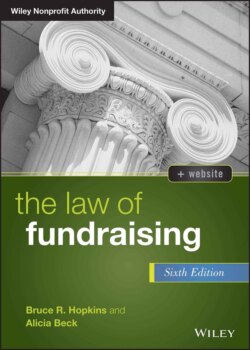Читать книгу The Law of Fundraising - Bruce R. Hopkins - Страница 37
§ 2.5 ROLE OF A LAWYER
ОглавлениеThe legal counsel who represents or otherwise works for a charitable organization that is ensnarled in regulation of its fundraising likewise has a multitude of responsibilities. In addition to all other tasks that must be undertaken in serving the organization, they should:
Review the law of each jurisdiction in which the organization solicits contributions and advise on compliance responsibilities.
See that all applications, forms, reports, and the like are properly prepared and timely filed.
Assist the organization where it is having difficulties with enforcement authorities, such as by helping prepare a statement in explanation of its fundraising costs or by arguing its case before administrative staff(s), state commission(s), or court(s).
Review and advise as to agreements between the organization and professional fundraisers and/or professional solicitors.
Assist the organization in the preparation of annual reports and other materials by which it presents its programs, sources of support, and expenses to the general public.
Keep abreast of recent developments in the law concerning government regulation of fundraising by charitable organizations.
One problem facing lawyers who represent charitable organizations in the fundraising setting warrants particular mention. It is common knowledge that some states regulate charitable fundraising more stringently than others. It is also common knowledge that the states will not proceed against charitable organizations that are not in compliance with their law without first contacting organizations and requesting their compliance. Thus, many charitable organizations decide to not register and otherwise comply with the law of one or more states until they receive a formal request from each state to do so. Consequently, the lawyer is often asked this question: Which states should the organization register in and which state's law can the organization “safely ignore” until or unless contacted by the regulatory authorities? The problem for the lawyer is that they ought not to counsel flouting or breaking the law. Thus, the lawyer should advise the charitable organization client that it must adhere to the law of every state in which it is soliciting contributions and not wait for some informal notice or otherwise wait “until caught.” The lawyer ought not to advise the charitable organization client to comply with the law in the “rigorous regulatory” states and “wait to see what happens” in the others.
There is one subject about which the law is nearly nonexistent: the extent to which a charitable organization must register and otherwise comply with state (and local) law when it is soliciting contributions by means of its website.57 Lawyers and others must await future developments for definitive answers on this point.
Occasionally, the argument will arise—either from charitable organizations or professional fundraisers, or both—that the states' charitable solicitation laws are inapplicable, either because the enforcement of them obstructs interstate commerce and/or that the law concerning use of the mails overrides state regulatory law. These contentions have been tried in the courts, have failed, and are not likely to have any currency in the future.
The lawyer's role in relation to fundraising regulation should not be performed in isolation but should be carefully coordinated, not only with the charitable organization's staff, officers, and governing board, but with other consultants, principally the accountant and the professional fundraiser.
